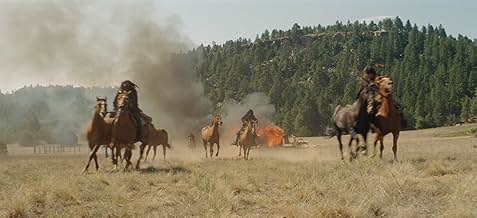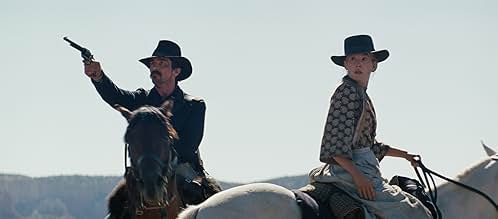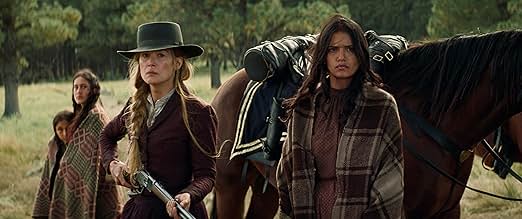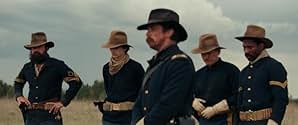Hostiles
En 1892, un légendaire capitaine d'armée accepte à contrecoeur d'escorter un chef Cheyenne et sa famille à travers un territoire dangereux.En 1892, un légendaire capitaine d'armée accepte à contrecoeur d'escorter un chef Cheyenne et sa famille à travers un territoire dangereux.En 1892, un légendaire capitaine d'armée accepte à contrecoeur d'escorter un chef Cheyenne et sa famille à travers un territoire dangereux.
- Réalisation
- Scénario
- Casting principal
- Récompenses
- 4 victoires et 7 nominations au total
Gray Wolf Herrera
- Apache Man
- (as Graywolf Herrera)
Timothée Chalamet
- Pvt. Philippe DeJardin
- (as Timothee Chalamet)
Avis à la une
Many reviewing Hostiles have chosen to seize upon avenues to criticize the film. Most common is the unfortunate chronological error where the Presidential order directing the mission was signed by Benjamin Harrison. This places the story in the period of 1889 to 1893, years too late to make sense.
Such a mistake is lamentable. The time period of the story would have ideally taken place from 1879 to 1880, when Rutherford Hayes was President, and the United States had largely defeated hostile tribes in the southwest and northern plains, but would be before the establishment of the railroad lines in New Mexico. This would have necessitated the pack mule excursion to Montana. It also would have allowed sufficient time to pass, given the references to Wounded Knee (1873) and Little Big Horn (1876), for the bitter memories to start to recede and allow the reflections shown in the movie to take place.
However, a fair review of this movie must avoid getting bogged down in historical minutia and instead focus on the story, because it is very poignant.
In many ways, this movie is to be congratulated for avoiding the modern day political traps that permeate so much of entertainment today.
The opening scene is brutal and forms the core of the story. A band of renegades attack a settlement home and leave a gash of misery in their wake. But, that is the coda of what the protagonists deal with, past chapters of great violence in a collision of hostile cultures.
The isolated acts of violence that happen later are as much a cleaning up of past deeds and a completion of the catharsis of reconciliation.
This movie is an immersion into the psyche of those who carry out acts of wartime violence, in a fight for survival, and how they try to retain their sanity and civility. As the story shows, some handle it better than others. None escape without deep scars.
There is a second theme that runs throughout the movie, ignorant people at the beginning and the end, attempting to lodge their persuasion onto the protagonists. None of these men suffered the wartime violence, but instead try to insert an empty moralizing, or attempt to enact their selfish will despite the clear Presidential mandate to allow the mission to proceed.
The reporter at the start of the film is silenced through humiliation. The second group at the end of the film meets a more lasting end. And at the end, we are left with shared misery among the few survivors, who try to bravely go on with what is left good to cling to.
Christian Bale is masterful in this movie. It is sad that his performance was not properly recognized.
Ultimately, this is a story of redemption, and in that regard it mirrors what took place over generations in America. A clash of survival ending with one side defeated, while both sides had to reconcile the shared experience of brutality. It avoids political finger-pointing, and in that regard strikes the proper degree of respect for both sides in this American struggle. It is a welcome addition to Hollywood's collection of period movies.
Such a mistake is lamentable. The time period of the story would have ideally taken place from 1879 to 1880, when Rutherford Hayes was President, and the United States had largely defeated hostile tribes in the southwest and northern plains, but would be before the establishment of the railroad lines in New Mexico. This would have necessitated the pack mule excursion to Montana. It also would have allowed sufficient time to pass, given the references to Wounded Knee (1873) and Little Big Horn (1876), for the bitter memories to start to recede and allow the reflections shown in the movie to take place.
However, a fair review of this movie must avoid getting bogged down in historical minutia and instead focus on the story, because it is very poignant.
In many ways, this movie is to be congratulated for avoiding the modern day political traps that permeate so much of entertainment today.
The opening scene is brutal and forms the core of the story. A band of renegades attack a settlement home and leave a gash of misery in their wake. But, that is the coda of what the protagonists deal with, past chapters of great violence in a collision of hostile cultures.
The isolated acts of violence that happen later are as much a cleaning up of past deeds and a completion of the catharsis of reconciliation.
This movie is an immersion into the psyche of those who carry out acts of wartime violence, in a fight for survival, and how they try to retain their sanity and civility. As the story shows, some handle it better than others. None escape without deep scars.
There is a second theme that runs throughout the movie, ignorant people at the beginning and the end, attempting to lodge their persuasion onto the protagonists. None of these men suffered the wartime violence, but instead try to insert an empty moralizing, or attempt to enact their selfish will despite the clear Presidential mandate to allow the mission to proceed.
The reporter at the start of the film is silenced through humiliation. The second group at the end of the film meets a more lasting end. And at the end, we are left with shared misery among the few survivors, who try to bravely go on with what is left good to cling to.
Christian Bale is masterful in this movie. It is sad that his performance was not properly recognized.
Ultimately, this is a story of redemption, and in that regard it mirrors what took place over generations in America. A clash of survival ending with one side defeated, while both sides had to reconcile the shared experience of brutality. It avoids political finger-pointing, and in that regard strikes the proper degree of respect for both sides in this American struggle. It is a welcome addition to Hollywood's collection of period movies.
Forget the talk of the film being slow, this isn't an action film or an old school shoot 'em up western, anyone looking for that should search elsewhere. Whilst there some great action scenes, where hostiles excels is in setting the tone for an early American world where law and order rest of gun power.
The cinematography is exceptional, meanwhile Christian Bale is superb playing a army captain who is seemingly tough and unflinching but shows an undertone of melancholy, Rosamunde Pike pulls of a great performance as a woman thrust into the ugly world of war and anarchy by a brutal attack on her family home, a scene is exceptional and unapologetically shocking.
Overall the film is about the futility of trying to civilise a wild land built on violence, and about the tragedy and the sheer pointlessness of conflict against fellow man.
80U
Christian Bale is absolutely tremendous, delivering a quietly intense performance in this brutal revisionist Western that carefully (yet incisively) examines the consequences of a merciless cycle of hatred that only dehumanizes people and turns them into beasts and monsters.
"Sometimes I envy the finality of death. The certainty. And I have to drive those thoughts away when I wake." Rosalie Quaid (Rosamund Pike)
Although Quaid's words might well be the anthem of this brutal, quiet, moving 1892 western, they harbinger the death of the Wild West and the birth of justice and equality as whites and Native Americans abandon slowly the death that brought little peace to either side. Appropriately the tone in unremittingly grave, and rightly so, for the film illustrates the wages of racism as well as any contemporary screed could try to do.
Writer/director Scott Cooper, who knows a thing or two about the passing of time and custom with his poignant Crazy Heart, drives home the loss of the Indian's world, the cost to the US troops, and the bereft families on each side. Captain Joe Blocker (Christian Bale), a legendary anti-Native American fighter, is charged with escorting Cheyenne war chief Yellow Hawk (Wes Studi), also a killer, and his family from New Mexico to his home in Montana, where the government determined he should be allowed to die.
Cooper is at his best filming landscapes occasionally punctuated with John-Ford-like door framed shots and themes of abduction and reconciliation. The threats along the way are external and internal, often soldiers just as culpable as the "savages" they hunt. Joe is a man on a mission to bring justice against the Indians, but like the times he's in, it is time to change to benevolence as the end of the century approaches and a kinder world of connection and cooperation begins, slowly and surely, like the film. The appreciation for a person regardless of race, is Cooper's ultimate aim. In ways, this Western is reminiscent of the revisionist Dances with Wolves, both of whose slow pace, almost at time painful, is reflective change's pace.
Cooper's shots are generous to the beautiful faces, from Mrs. Quaid's lovely and the stoically-contemplative Joe's to the chief's landscaped leather. The ensemble is first rate, especially the feisty Ben Foster as Sgt. Charles Wills. The landscapes? well, look at Ford's and feel his tradition.
Although Quaid's words might well be the anthem of this brutal, quiet, moving 1892 western, they harbinger the death of the Wild West and the birth of justice and equality as whites and Native Americans abandon slowly the death that brought little peace to either side. Appropriately the tone in unremittingly grave, and rightly so, for the film illustrates the wages of racism as well as any contemporary screed could try to do.
Writer/director Scott Cooper, who knows a thing or two about the passing of time and custom with his poignant Crazy Heart, drives home the loss of the Indian's world, the cost to the US troops, and the bereft families on each side. Captain Joe Blocker (Christian Bale), a legendary anti-Native American fighter, is charged with escorting Cheyenne war chief Yellow Hawk (Wes Studi), also a killer, and his family from New Mexico to his home in Montana, where the government determined he should be allowed to die.
Cooper is at his best filming landscapes occasionally punctuated with John-Ford-like door framed shots and themes of abduction and reconciliation. The threats along the way are external and internal, often soldiers just as culpable as the "savages" they hunt. Joe is a man on a mission to bring justice against the Indians, but like the times he's in, it is time to change to benevolence as the end of the century approaches and a kinder world of connection and cooperation begins, slowly and surely, like the film. The appreciation for a person regardless of race, is Cooper's ultimate aim. In ways, this Western is reminiscent of the revisionist Dances with Wolves, both of whose slow pace, almost at time painful, is reflective change's pace.
Cooper's shots are generous to the beautiful faces, from Mrs. Quaid's lovely and the stoically-contemplative Joe's to the chief's landscaped leather. The ensemble is first rate, especially the feisty Ben Foster as Sgt. Charles Wills. The landscapes? well, look at Ford's and feel his tradition.
Scott Cooper's 'Hostiles' is a poetic film, that explores life & death with gut-wrenching violence & a hard-hitting narrative. This isn't an easy watch & nor does it want to be. Its a film about hate, divide & circumstances, & Cooper along-with leading-man Christian Bale, deliver a deeply affecting & meditative experience.
'Hostiles' follows a U.S. Cavalry officer (Bale) who must escort a Cheyenne war chief (A Fantastic Wes Studi) and his family back to their home in Montana in 1892.
'Hostiles' is about people haunted by their past & their actions towards one-another. Every character here, be it the protagonist, or the characters around him, are unsettled & victims of hate & hatred. This is a story about people who want to question their hate for one-another, but are unable to, due to their given circumstances. This is a human story & the sheer brutality here depicts a side of humanity we all are aware off. Its told with honesty, albeit, with gut-wrenching aggression.
Scott Cooper is in top-form this time around. 'Hostiles' is a slow-moving, poetic piece, that sees the filmmaker in strong command. Cooper captures the bleakness & conflict, with remarkable understanding. Cooper's Vision is astonishingly captured by Cinematographer Masanobu Takayanagi, who paints 'Hostiles' into a visual marvel. Takayanagi's Camerawork is meditative & skillful to the point of perfection. Editing by Tom Cross adapts perfectly to the film's pace & offers sharpness overall. Art & Costume Design are pitch-perfect. Max Richter's Score is beautiful.
Performance-Wise: Christian Bale delivers a knockout performance. As the conflicted & haunted Cavalry officer, Bale portrays the part with rare conviction. Its no new fact that Bale is among our greats, but 'Hostiles' shows us a side of his that may have just put him up there, right next to the all-time screen giants. What a wonderfully nuanced performance by Bale. Of the rest of the cast, Wes Studi portrays his complex part fantastically. Rosamund Pike is restrained. She's controlled & believable all through. Jesse Plemons is solid, as always. Ben Foster plays a yet another unlikable character, with the perfect blend of menace & insanity. Rory Cochrane is first-rate. Timothée Chalamet makes a very brief appearance, yet he does his bit nicely. Stephen Lang, again in a cameo, is outstanding! Others lend good support.
On the whole, 'Hostiles' demands a viewing on the strength of its sheer merits. Don't Miss This One!
'Hostiles' follows a U.S. Cavalry officer (Bale) who must escort a Cheyenne war chief (A Fantastic Wes Studi) and his family back to their home in Montana in 1892.
'Hostiles' is about people haunted by their past & their actions towards one-another. Every character here, be it the protagonist, or the characters around him, are unsettled & victims of hate & hatred. This is a story about people who want to question their hate for one-another, but are unable to, due to their given circumstances. This is a human story & the sheer brutality here depicts a side of humanity we all are aware off. Its told with honesty, albeit, with gut-wrenching aggression.
Scott Cooper is in top-form this time around. 'Hostiles' is a slow-moving, poetic piece, that sees the filmmaker in strong command. Cooper captures the bleakness & conflict, with remarkable understanding. Cooper's Vision is astonishingly captured by Cinematographer Masanobu Takayanagi, who paints 'Hostiles' into a visual marvel. Takayanagi's Camerawork is meditative & skillful to the point of perfection. Editing by Tom Cross adapts perfectly to the film's pace & offers sharpness overall. Art & Costume Design are pitch-perfect. Max Richter's Score is beautiful.
Performance-Wise: Christian Bale delivers a knockout performance. As the conflicted & haunted Cavalry officer, Bale portrays the part with rare conviction. Its no new fact that Bale is among our greats, but 'Hostiles' shows us a side of his that may have just put him up there, right next to the all-time screen giants. What a wonderfully nuanced performance by Bale. Of the rest of the cast, Wes Studi portrays his complex part fantastically. Rosamund Pike is restrained. She's controlled & believable all through. Jesse Plemons is solid, as always. Ben Foster plays a yet another unlikable character, with the perfect blend of menace & insanity. Rory Cochrane is first-rate. Timothée Chalamet makes a very brief appearance, yet he does his bit nicely. Stephen Lang, again in a cameo, is outstanding! Others lend good support.
On the whole, 'Hostiles' demands a viewing on the strength of its sheer merits. Don't Miss This One!
Le saviez-vous
- AnecdotesThe widow of credited screenwriter Donald E. Stewart found the "Hostiles" script when moving houses. Stewart, who died in 1999, had not shipped the manuscript to any studios, and his wife was surprised to come across it. After seeing Crazy Heart (2009) and Les brasiers de la colère (2013), she felt that Scott Cooper was the right man to shepherd it towards the screen.
- GaffesThere is a single African-American soldier, Corporal Henry Woodson, in an otherwise White cavalry regiment. The only Black cavalrymen in the regular army were in the 9th and 10th regiments, where only the officers were White.
- Citations
Rosalie Quaid: Sometimes I envy the finality of death. The certainty. And I have to drive those thoughts away when I'm weak.
- ConnexionsFeatured in WatchMojo: Top 10 Failed Oscar Bait Movies of 2017 (2018)
Meilleurs choix
Connectez-vous pour évaluer et suivre la liste de favoris afin de recevoir des recommandations personnalisées
- How long is Hostiles?Alimenté par Alexa
Détails
- Date de sortie
- Pays d’origine
- Site officiel
- Langues
- Aussi connu sous le nom de
- Hostiles: Violencia americana
- Lieux de tournage
- Angel Fire, Nouveau-Mexique, États-Unis(exterior scenes)
- Sociétés de production
- Voir plus de crédits d'entreprise sur IMDbPro
Box-office
- Budget
- 39 000 000 $US (estimé)
- Montant brut aux États-Unis et au Canada
- 29 819 114 $US
- Week-end de sortie aux États-Unis et au Canada
- 22 849 $US
- 24 déc. 2017
- Montant brut mondial
- 35 669 017 $US
- Durée2 heures 14 minutes
- Couleur
- Mixage
- Rapport de forme
- 2.39 : 1
Contribuer à cette page
Suggérer une modification ou ajouter du contenu manquant







































